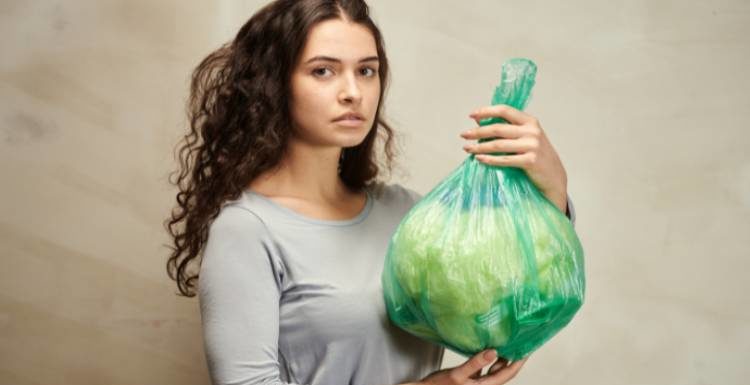
The average American produces about 1,600 pounds of garbage every year. Though you can’t stop producing trash altogether, you can reduce the amount of garbage you produce by reusing, recycling, composting, and shopping for products that minimize waste.
Table of Contents
Reusing
One of the best ways to reduce waste is to avoid throwing away things that you can reuse. A few of the most easily reusable items include:
- Bags: Collect and reuse your plastic grocery bags whenever you visit the supermarket. Better yet, switch to canvas grocery bags. Many supermarkets offer a small discount to customers who reuse bags, since you’re saving the supermarket money.
- Cardboard boxes: Reuse shipping boxes to send other shipments or for storage, or cut them up for kindling.
- Egg cartons: Use these to store golf balls or other round items, or fill them with soil to start plant seedlings.
- Glass bottles and jars: Use as vases, candle holders, or containers for homemade foods, sauces, loose change, or other items.
- Junk mail: Store junk-mail envelopes and use them for scratch paper. Cut up or shred junk mail and use it as a packaging insulator when shipping packages.
- Newspaper: Use as kindling in the winter, as cushioning when wrapping fragile items for shipment or storage, or as an absorbent lining for pet cages or cat litter boxes.
-
Plastic take-out food containers: Clean them out and use them to store food or other items.
Recycling
By recycling, you can diminish the waste that you produce by as much as 75%. Even if you’re among the millions of Americans who already recycle, chances are you can do more to optimize the recycling you currently do.
Learn the Local Rules
Recycling policies vary widely from place to place. Check with your local recycler (usually your sanitation company) to learn which materials can be recycled in your area.
For instance, some providers recycle only paper, whereas others recycle plastic, glass, aluminum, electronics, and more.
If your local sanitation doesn’t accept all of the above items, that doesn’t necessarily mean you can’t recycle them—consult the phone book to find independently operated recycling providers that will accept these items.
Know the Symbols
All recyclable glass and plastic containers include a number code on the bottom. These numbers range from 1–7.
Make sure you know which numbers your recycler accepts. Once you find out, recycle only items that show those numbers rather than assume that any plastic or glass item can be recycled.
Prepare Recyclables for Recycling
Before depositing materials such as glass and plastic into the recycle bin:
- Rinse out containers thoroughly
- Peel off labels
- Remove caps, corks, and lids from bottles and jars
- Compress plastic and paper to save space
“Hard-to-Recycle” Materials
Beyond paper, plastic, and glass, dozens of other materials can be recycled, including cell phones, computers, paints, and household cleaners. Consult the phone book or your local recycling provider to ask about specialty recycling centers. In some cases, you may need to pay a small fee to recycle these “hard-to-recycle” materials.
Composting
Composting is the process of converting your organic waste into compost, a nutrient-rich mixture used to improve the quality of soil for gardening.
You can create compost by placing organic waste (any type of plant or plant-based food is best) in an outdoor compost bin, in which the material decomposes into compost over time. A recycled plastic or wire-frame compost bin should cost about $30–50 at your local gardening center or online.
Even if you don’t use compost for gardening, composting is still a great way to reduce the amount of trash you produce. Rather than end up in a landfill, your food waste and other organic waste (such as fallen leaves or grass clippings from your lawn mower) can be reused by local gardeners and landscapers.
Many towns have compost drop-off locations at their sanitation facilities—you drop off your compost, and people who can use it will pick it up for free. If your town doesn’t offer such a service and you don’t know a local gardener or landscaper, try posting a free classified ad on Craigslist (www.craigslist.org) to find someone who can use your compost.
Shopping to Minimize Waste
You can help reduce the amount of waste you produce that ends up in landfills by shopping for Earth-friendly products.
- Pay attention to packaging: Try to buy products that minimize packaging. For instance, rather than buy a 12-pack of small bottled drinks, buy one large bottle.
- Buy recycled: Most paper products, such as toilet paper, paper towels, and printer paper, are available in recycled versions—look for products marked “made from 100% post-consumer recycled materials.” Though these products cost more than their nonrecycled versions, by buying them you support the market for environmentally friendly products.
- Buy recyclable: If you must buy disposable products, buy versions that can be most easily recycled. For instance, rather than buy plastic or styrofoam plates, buy paper plates. When buying milk or juice, favor brands that offer paper-based packaging.


